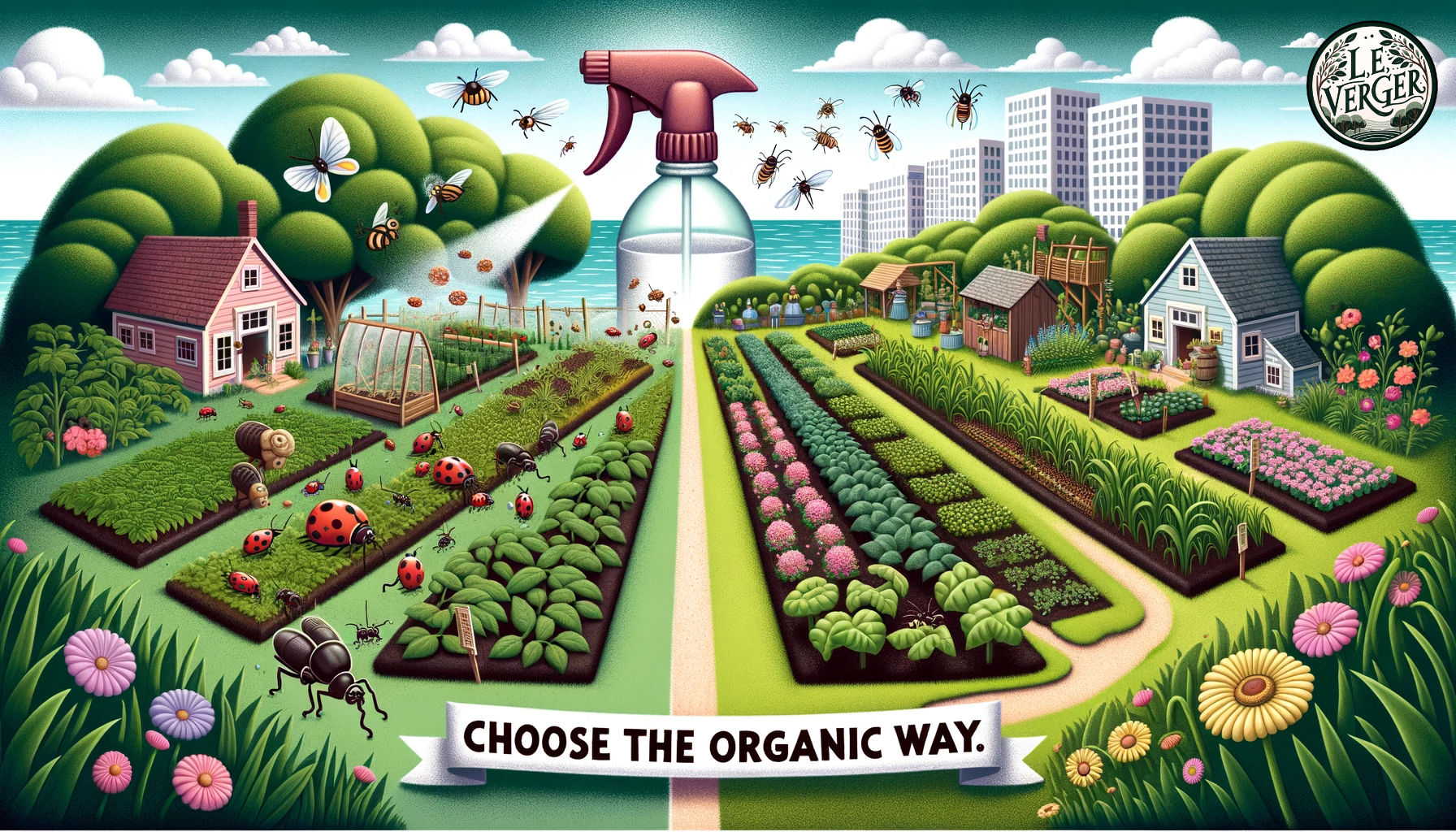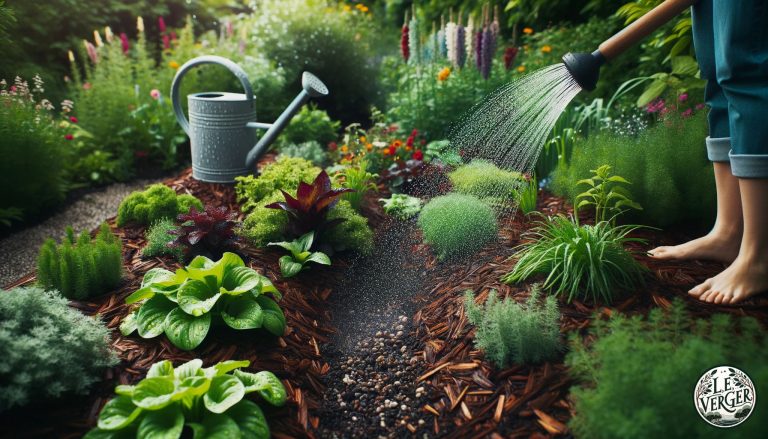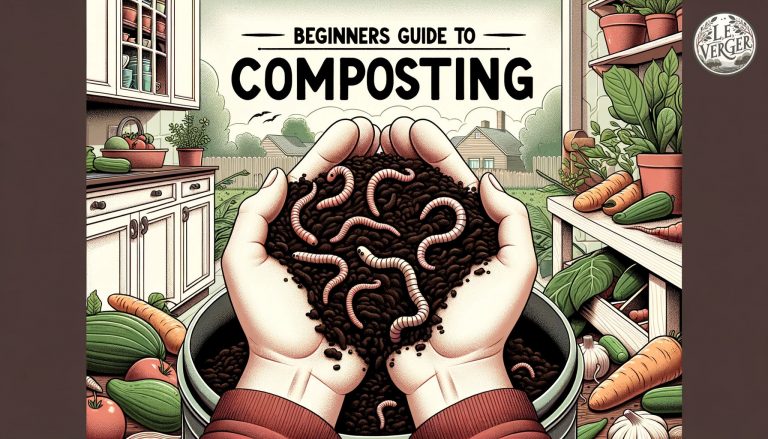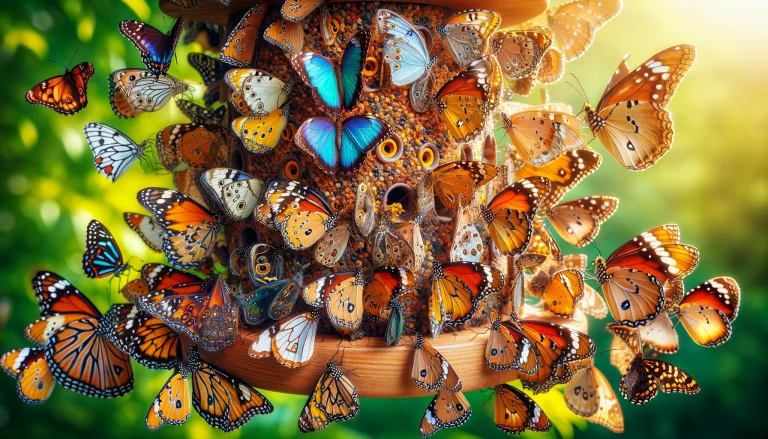Encouraging Beneficial Insects: Pest Control the Organic Way
Struggling with garden pests? Imagine a natural solution that doesn’t involve chemicals. Learn how to attract beneficial insects that naturally combat harmful pests. Intrigued? Read on to transform your garden.
Are you tired of using harmful chemicals to control pests in your garden? There is a better way to manage pests organically. By encouraging beneficial insects to your garden, you can maintain a healthy and thriving ecosystem without using any harmful chemicals.
Organic pest control involves understanding the role of beneficial insects in your garden and how to attract them. Beneficial insects such as ladybugs, parasitic wasps, lacewings, hoverflies, and minute pirate bugs are natural enemies of harmful pests. By attracting these insects to your garden, you can create a natural balance that reduces the need for chemical pesticides.
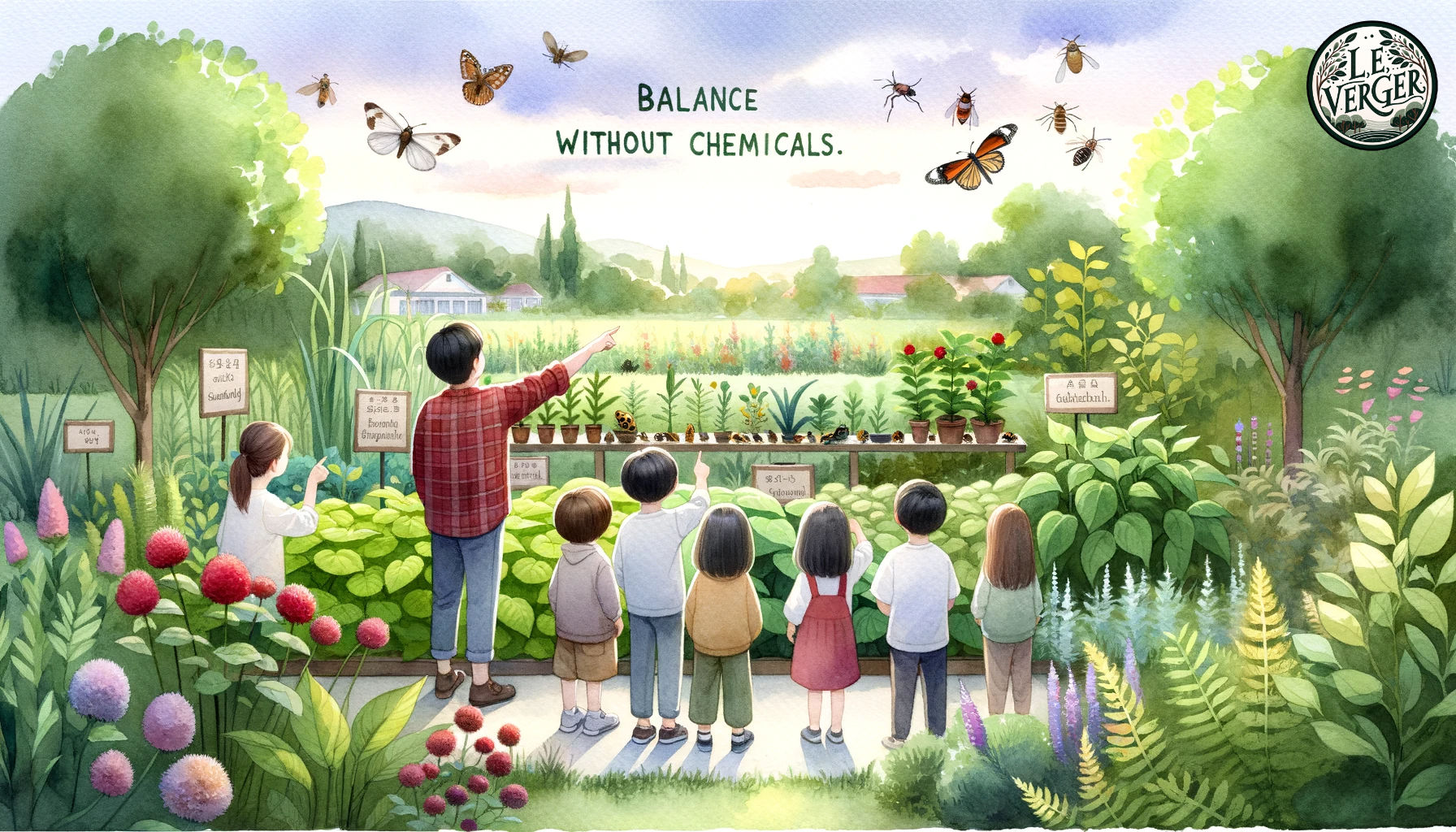
To encourage beneficial insects, you need to select the right plants and create a diverse landscape that provides habitat and shelter for them. You can also use organic pest control methods such as crop rotation, companion planting, and natural predators to manage garden pests. By adopting these practices, you can promote a healthy and sustainable garden ecosystem that benefits both your health and the environment.
Key Takeaways
- Organic pest control involves encouraging beneficial insects to your garden.
- Beneficial insects are natural enemies of harmful pests and can help maintain a healthy ecosystem.
- You can attract beneficial insects by selecting the right plants and using organic pest control methods.
Understanding Organic Pest Control
If you’re interested in sustainable agriculture, you might have heard of organic pest control. This method of pest control uses natural methods to manage pests instead of relying on synthetic chemicals. The goal is to promote biodiversity and encourage beneficial insects that can help keep pest populations in check.
Organic pest control is often part of a larger approach called integrated pest management (IPM). IPM combines different pest control methods to create a more comprehensive and effective approach. Organic pest control is just one of the many methods that can be used in IPM.
One of the key principles of organic pest control is biological control. This involves using living organisms to control pest populations. For example, you might introduce ladybugs or lacewings to your garden to eat aphids. Another example is using nematodes to control soil-borne pests like root maggots.
Another principle of organic pest control is creating a healthy ecosystem. By promoting biodiversity and creating a healthy environment for plants and animals, you can help prevent pest problems from occurring in the first place. This can include things like crop rotation, cover crops, and companion planting.
Organic pest control can be a great way to manage pests in a way that is more environmentally friendly and sustainable. However, it’s important to remember that it’s not a silver bullet. It can take time and effort to implement, and it may not be as effective as synthetic pesticides in some situations. It’s important to carefully consider your options and choose the best approach for your specific situation.
The Role of Beneficial Insects
When it comes to pest control in organic gardening, beneficial insects play a crucial role. These good bugs offer a targeted approach to pest control, focusing on specific pest species while leaving non-target organisms unharmed. Unlike broad-spectrum chemical pesticides, which may harm beneficial insects and disrupt the overall ecosystem, natural enemies selectively prey on pest populations, maintaining a balance that promotes long-term pest control.
One of the most well-known beneficial insects is the bee. Bees are important pollinators, which means they help plants produce fruits and seeds. Without bees, many plants would not be able to reproduce. Other beneficial insects include ladybirds, lacewings, hoverflies, and lady beetles. These predators feed on aphids, mites, and other pests that can damage plants.
Another beneficial insect is the aphid lion, the larvae of lacewings. These larvae are voracious predators of aphids, and can eat up to 60 aphids per day. They also prey on other soft-bodied insects, such as whiteflies and mealybugs.
Beneficial insects not only act as predators, but also as parasites. Parasitoid wasps, for example, lay their eggs inside the bodies of other insects, such as caterpillars or aphids. The wasp larvae then feed on the host insect, eventually killing it. While this may seem gruesome, it is an effective way to control pest populations without harming other organisms in the ecosystem.
In addition to their role as predators and parasites, some beneficial insects also act as pollinators. Hoverflies, for example, feed on nectar and pollen, and in doing so, transfer pollen from one flower to another. This helps plants produce fruits and seeds, which is important for maintaining biodiversity.
Overall, encouraging beneficial insects in your garden is an important part of organic pest control. By providing habitat and food for these insects, you can help maintain a healthy ecosystem in your garden, while reducing the need for harmful chemical pesticides.
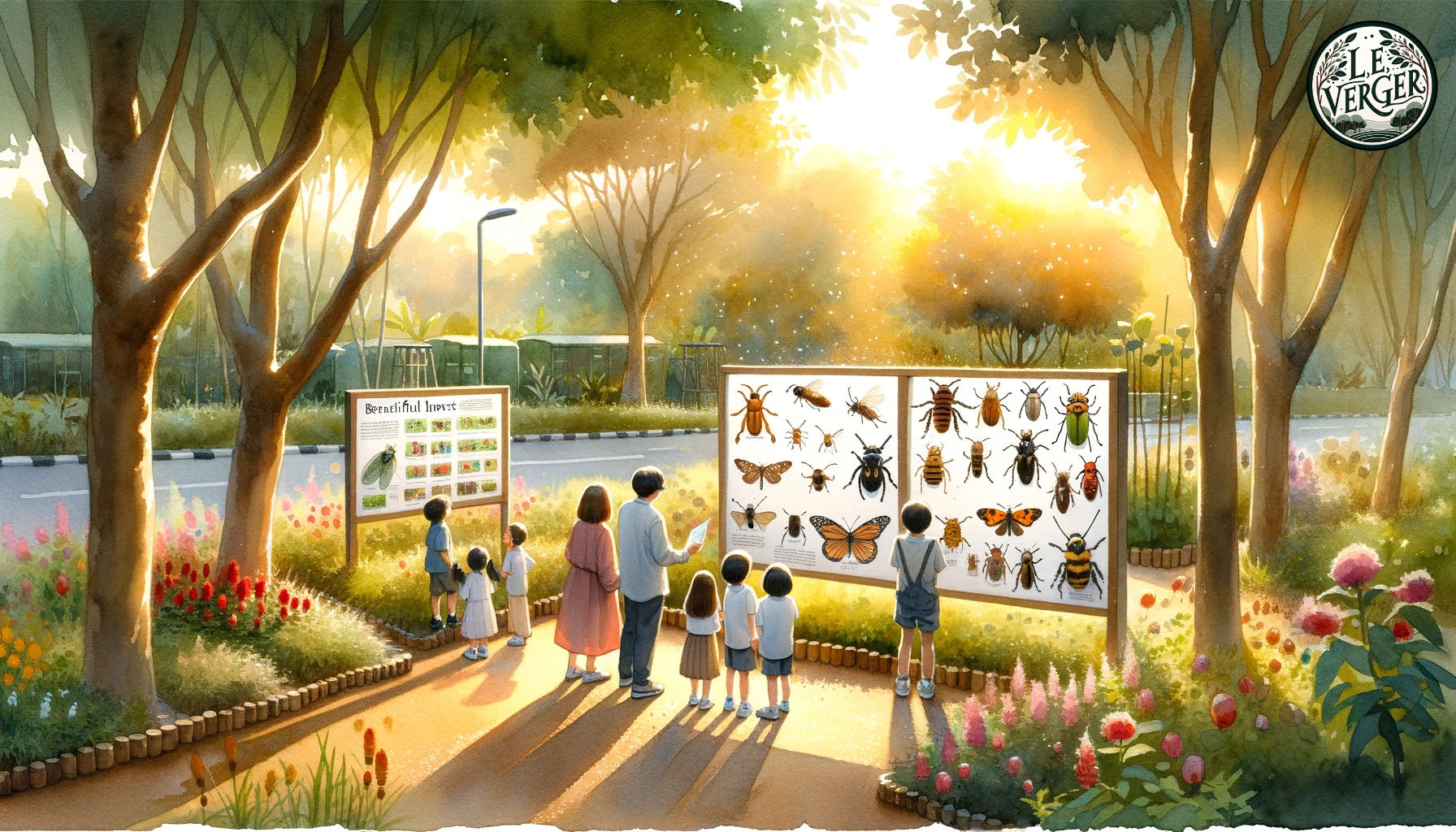
Attracting Beneficial Insects to Your Garden
Encouraging beneficial insects to your garden is a great way to control pests naturally. By creating an environment that is attractive to these insects, you can reduce the need for harmful pesticides and promote a healthy ecosystem in your garden. Here are some tips to help you attract beneficial insects to your garden:
Plant Flowers and Plants
Planting flowers and plants is an excellent way to attract beneficial insects to your garden. Flowers like marigolds, daisies, and sunflowers are great sources of pollen and nectar and can attract bees, butterflies, and other pollinators. Herbs like fennel, dill, and parsley can attract beneficial insects like ladybugs and lacewings.
Provide Pollen and Nectar
Beneficial insects need a source of pollen and nectar to survive. By planting flowers and herbs that provide these resources, you can attract a variety of beneficial insects to your garden. Consider planting a mix of annuals and perennials to provide a continuous source of food throughout the growing season.
Create Habitat
Creating a habitat for beneficial insects is important to encourage them to stay in your garden. Provide shelter and nesting sites by leaving some areas of your garden undisturbed. Piles of leaves, logs, and rocks can provide shelter for beneficial insects like ground beetles and spiders.
Promote Biodiversity
Promoting biodiversity in your garden is important to attract a variety of beneficial insects. By planting a mix of flowers, herbs, and vegetables, you can create a diverse ecosystem that supports a wide range of insects. Avoid planting large monocultures, which can reduce biodiversity and attract pests.
Provide Water Sources
Providing a source of water is important to attract beneficial insects to your garden. A shallow dish filled with water can provide a place for insects to drink and cool off. Be sure to change the water regularly to prevent mosquitoes from breeding.
Consider Companion Planting
Companion planting involves planting different crops together to benefit each other. For example, planting marigolds with tomatoes can help repel pests and attract beneficial insects. Do some research to find out which plants work well together and consider incorporating companion planting into your garden.
Farmscaping
Farmscaping involves planting native plants and creating habitats to attract beneficial insects to farms and agricultural landscapes. By incorporating these practices into your garden, you can help support local biodiversity and create a healthy ecosystem.
Use Attractants
Using attractants like pheromone traps and sticky traps can help attract and trap pests without harming beneficial insects. Be sure to use these traps sparingly and only when necessary.
By following these tips, you can create a garden that is attractive to beneficial insects and promotes a healthy ecosystem. Encouraging biodiversity, providing food and shelter, and avoiding harmful pesticides can help control pests naturally and create a thriving garden.
Plant Selection for Beneficial Insects
When it comes to pest control, the best way to keep your garden healthy and thriving is to encourage beneficial insects to take up residence. One of the easiest ways to do this is by planting a variety of flowers and herbs that attract these helpful bugs. Here are some of the best plants to choose from:
- Yarrow: This hardy perennial is a must-have for any garden. Its small white or yellow flowers attract a wide variety of beneficial insects, including ladybugs, lacewings, and hoverflies.
- Coriander: Not only is coriander a tasty herb, but its flowers also attract beneficial insects like parasitic wasps and hoverflies. Plus, it’s easy to grow from seed and can be harvested all season long.
- Cosmos: These showy annuals come in a variety of colours and make a great addition to any flower bed. They attract a wide variety of beneficial insects, including bees, butterflies, and parasitic wasps.
- Garlic: Not only does garlic repel many common garden pests, but its flowers also attract beneficial insects like hoverflies and ladybugs.
- Marigolds: These bright, cheerful flowers are a favourite of many beneficial insects, including ladybugs, lacewings, and parasitic wasps. Plus, they’re easy to grow from seed and can be used to border your vegetable garden.
- Mint: This fragrant herb is a favourite of bees and other pollinators. It’s also a great way to repel pests like ants and aphids.
- Corn: Believe it or not, corn is a great way to attract beneficial insects to your garden. Its tassels produce a sweet, sticky substance that attracts ladybugs, lacewings, and other helpful bugs.
- Dill: This herb is a favourite of swallowtail butterflies and their larvae. It also attracts beneficial insects like parasitic wasps and hoverflies.
- Fennel: Fennel is another great herb to grow if you want to attract swallowtail butterflies. Its flowers also attract beneficial insects like parasitic wasps and hoverflies.
- Rosemary: This fragrant herb is a favourite of bees and other pollinators. It’s also a great way to repel pests like cabbage moths and carrot flies.
- Clover: This low-growing plant is a favourite of many beneficial insects, including bees, butterflies, and parasitic wasps. Plus, it’s a great way to add nitrogen to your soil.
- Borage: This annual herb produces beautiful blue flowers that attract a wide variety of beneficial insects, including bees, butterflies, and parasitic wasps.
- California Poppy: This colourful annual is a favourite of many beneficial insects, including bees and parasitic wasps.
- Candytuft: This low-growing annual produces clusters of white or pink flowers that attract a wide variety of beneficial insects, including bees, butterflies, and parasitic wasps.
- Lobelia: This low-growing annual produces clusters of blue or purple flowers that attract a wide variety of beneficial insects, including bees, butterflies, and parasitic wasps.
- Sunflowers: These tall, showy flowers are a favourite of bees and other pollinators. They also attract beneficial insects like ladybugs and lacewings.
- Sweet Alyssum: This low-growing annual produces clusters of white or pink flowers that attract a wide variety of beneficial insects, including bees, butterflies, and parasitic wasps.
- Anise Hyssop: This fragrant herb produces spikes of purple flowers that attract a wide variety of beneficial insects, including bees, butterflies, and parasitic wasps.
- Comfrey: This hardy perennial produces clusters of purple or white flowers that attract a wide variety of beneficial insects, including bees, butterflies, and parasitic wasps.
- Goldenrod: This tall, showy perennial produces clusters of yellow flowers that attract a wide variety of beneficial insects, including bees, butterflies, and parasitic wasps.
- Lavender: This fragrant herb is a favourite of bees and other pollinators. It’s also a great way to repel pests like moths and fleas.
- Bergamot: This fragrant herb produces spikes of pink or purple flowers that attract a wide variety of beneficial insects, including bees, butterflies, and parasitic wasps.
- Marjoram: This fragrant herb produces clusters of pink or white flowers that attract a wide variety of beneficial insects, including bees, butterflies, and parasitic wasps.
- Phacelia: This annual produces clusters of blue or purple flowers that attract a wide variety of beneficial insects, including bees, butterflies, and parasitic wasps.
- Poppy: This annual produces showy flowers in a variety of colours that attract beneficial insects like bees, hoverflies, and lacewings.
You can create a balanced ecosystem in your garden by planting a diverse range of flowers and herbs that attract beneficial insects. These helpful bugs will prey on common garden pests, pollinate your plants, and improve soil health. A garden filled with yarrow, mint, cosmos, and other insectary plants is a sustainable, eco-friendly way to control pests and support a thriving, vibrant landscape.
Managing Garden Pests Organically
If you’re looking for a natural way to control garden pests, then organic pest control is the way to go. Not only is it better for the environment, but it’s also safer for you, your family, and your pets. Here are some tips for managing garden pests organically:
Encourage Beneficial Insects
One of the best ways to control garden pests is to encourage beneficial insects to take up residence in your garden. Ladybugs, ground beetles, and parasitic wasps are just a few examples of insect species that love to feed on soft-bodied pests like aphids, mealybugs, and slugs. You can attract these insects to your garden by planting flowers like daisies, marigolds, and sunflowers.
Crop Rotation
Crop rotation is another effective way to control garden pests. By rotating your crops, you can break the life cycle of pests like beetles and mealybugs, which can help reduce their numbers.
Use Organic Pest Control Products
There are many organic pest control products available that can help you manage garden pests. Some of the most effective options include neem oil, insecticidal soap, and diatomaceous earth. These products work by suffocating or dehydrating pests, making them a safe and natural alternative to chemical pesticides.
Companion Planting
Companion planting is the practice of planting certain plants together to help repel pests. For example, planting garlic or chives next to your tomatoes can help repel aphids, while planting marigolds next to your beans can help repel beetles.
Protect Your Garden from Deer
If you have a problem with deer eating your plants, there are a few things you can do to protect your garden. One option is to plant deer-resistant plants like lavender, sage, and yarrow. Another option is to use deer repellents like garlic spray or predator urine.
By following these tips, you can manage garden pests organically and keep your garden healthy and thriving.
The Role of Birds and Pollination
If you’re looking for a natural way to control pests in your garden, don’t forget about the role birds and pollinators play. Birds can help control insect populations by eating pests that would otherwise damage your plants. They also play a crucial role in pollination, which is essential for plant reproduction.
Pollinators, such as honeybees, are responsible for transferring pollen from the male to the female parts of flowers, which allows plants to produce seeds and fruit. Without pollinators, many of the plants we rely on for food would not be able to reproduce.
Birds also play a role in pollination, particularly for plants that are not visited by bees. Some bird species, such as hummingbirds, have long beaks that allow them to reach the nectar deep inside flowers. As they feed, they transfer pollen from one flower to another, allowing for cross-pollination.
Encouraging birds and pollinators in your garden is easy. You can provide food and shelter for birds by planting native plants that produce berries and seeds, and by putting up bird feeders and birdhouses. To attract pollinators, plant a variety of flowers that bloom at different times throughout the growing season, and avoid using pesticides that can harm bees and other beneficial insects.
By encouraging birds and pollinators in your garden, you can create a healthy ecosystem that will help control pests and promote plant pollination.
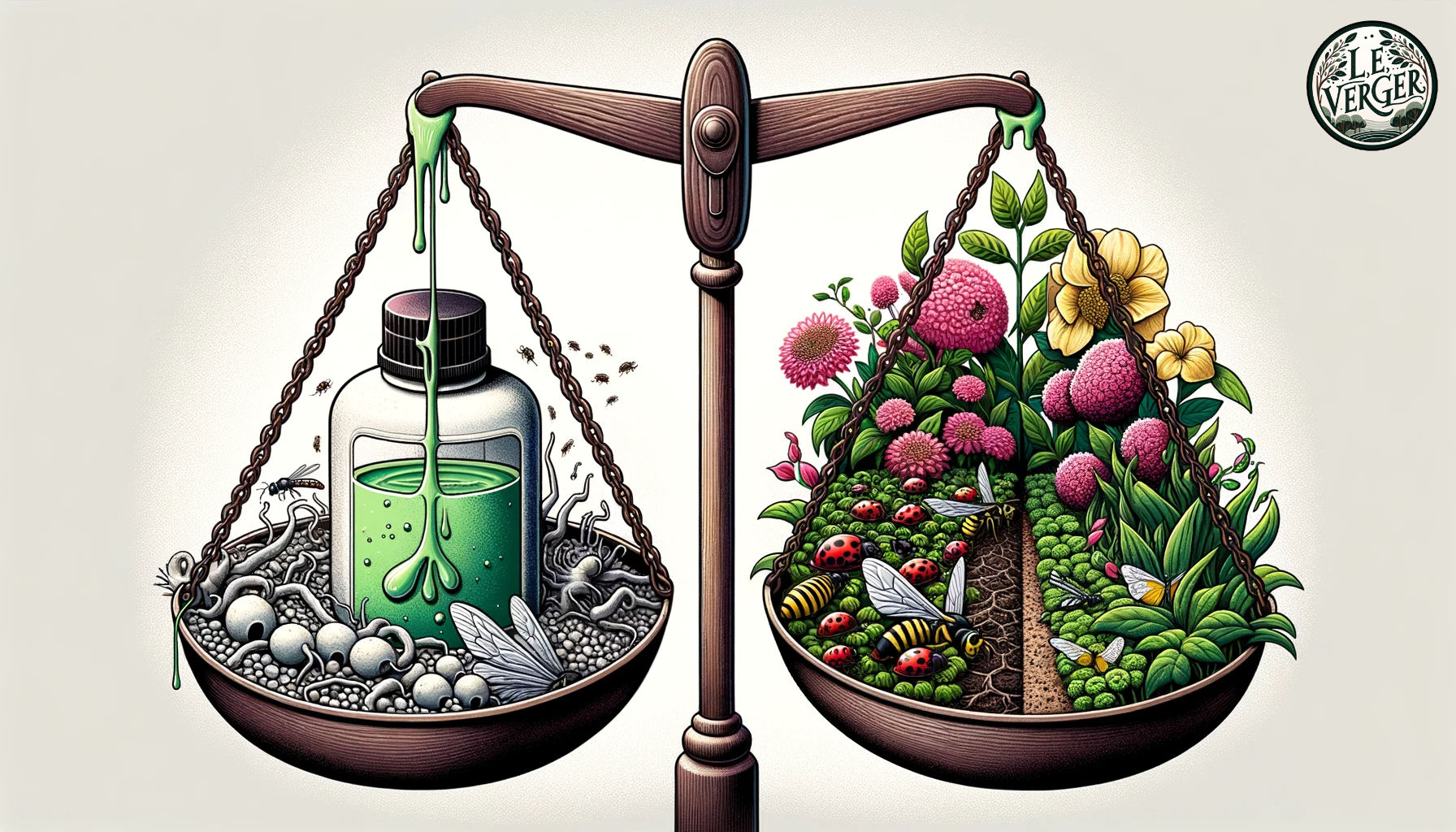
Impact on Health and Environment
When it comes to pest control, the use of pesticides can have a negative impact on both the environment and human health. Pesticides can contaminate soil, water, and air, harming not only pests but also beneficial insects, wildlife, and even humans. On the other hand, organic pest control methods, such as encouraging beneficial insects, can help maintain a healthy environment.
Chemicals used in pesticides can be toxic to humans and animals. Pesticide exposure can lead to health problems such as skin irritation, respiratory problems, and even cancer. The use of pesticides can also contribute to the development of antibiotic-resistant bacteria, making it harder to treat infections.
In addition to human health risks, the use of pesticides can also harm the environment. Pesticides can contaminate soil and water, leading to pollution and damage to ecosystems. Pesticides can also kill beneficial insects, such as bees, which are crucial for pollination and maintaining a healthy ecosystem.
Organic pest control methods, such as encouraging beneficial insects, can help maintain a healthy environment. By creating a habitat that attracts beneficial insects, such as ladybugs and lacewings, you can reduce the need for pesticides. These insects can help control pest populations naturally, without the use of harmful chemicals.
In conclusion, the use of pesticides can have negative impacts on both the environment and human health. Organic pest control methods, such as encouraging beneficial insects, can help maintain a healthy environment and reduce the need for harmful chemicals. By taking a proactive approach to pest control, you can help protect the environment and promote a healthy ecosystem.

Understanding Soil and Plant Health
To successfully implement organic pest control methods, it is essential to understand the importance of soil and plant health. A healthy soil ecosystem is vital for growing healthy plants that are resistant to pests and diseases.
The soil food web is a complex system of organisms that interact with each other and with the soil to create a healthy environment for plants to grow. Beneficial microorganisms, such as bacteria and fungi, help to break down organic matter in the soil and release nutrients that plants need to grow.
Understanding your hardiness zone and bloom dates can also help you choose the right plants for your garden. Planting native plants that are adapted to your climate and soil conditions can help you create a healthy ecosystem that is more resistant to pests and diseases.
To encourage beneficial insects in your garden, consider planting a variety of flowers and herbs. Wildflowerinformation.org is a great resource for finding native wildflowers that are attractive to beneficial insects.
In addition to planting the right plants, it is important to maintain good soil health by adding organic matter, such as compost or mulch, to the soil. This helps to improve soil structure, retain moisture, and provide nutrients for plants.
By understanding the importance of soil and plant health, you can create a healthy and resilient garden that is more resistant to pests and diseases.
Conclusion
Incorporating beneficial insects into your organic farming practices can provide a sustainable solution to pest management. By reducing pesticide usage, improving ecosystem balance, ensuring cost-effectiveness, and promoting sustainable agriculture principles, these insects can contribute significantly to the success of your farm.
Nature has provided us with a variety of insects that can help control pests in a natural way. Some of the most commonly used beneficial insects for natural pest control include ladybugs, lacewings, praying mantis, and parasitic wasps. These insects can help control a wide range of pests, including aphids, mites, and caterpillars.
In addition to using beneficial insects, it is important to maintain healthy foliage and soil. Healthy plants are more resistant to pests and diseases, which can help reduce the need for pesticides. You can achieve healthy foliage by providing adequate water, nutrients, and sunlight to your crops.
Overall, incorporating beneficial insects and maintaining healthy foliage and soil can help you achieve natural pest control in your organic farm. By adopting these practices, you can reduce your reliance on harmful pesticides and promote a more sustainable and eco-friendly approach to agriculture.
Frequently Asked Questions
How can I encourage beneficial insects to control pests in my garden?
Encouraging beneficial insects can be a great way to control pests in your garden. You can do this by planting flowers that attract beneficial insects such as ladybirds, hoverflies, and lacewings. These insects feed on pests and can help to keep them under control. You can also provide shelter for these insects by creating habitats such as log piles, insect hotels, and planting hedges.
What are some natural methods for pest control in agriculture?
There are many natural methods for pest control in agriculture. One method is to use biological control, which involves using natural predators to control pests. This can be done by releasing predators such as ladybirds, lacewings, and parasitic wasps into the area. Another method is to use crop rotation, which involves planting different crops in different areas each year. This can help to reduce the build-up of pests in the soil.
What are some non-chemical ways to control pests and diseases in plants?
Non-chemical ways to control pests and diseases in plants include using physical barriers such as netting to keep pests away from plants. You can also use companion planting, which involves planting certain plants together that can help to repel pests. Additionally, you can use organic sprays such as neem oil or garlic spray to control pests and diseases.
What is the best organic pest control method and why?
The best organic pest control method depends on the type of pest and the situation. However, one of the most effective methods is biological control. This involves using natural predators to control pests, which can be more effective and environmentally friendly than chemical pesticides.
What is the RHS recommended approach to bug and mildew control?
The Royal Horticultural Society (RHS) recommends a number of approaches to bug and mildew control. These include encouraging natural predators, using physical barriers such as netting, and using organic sprays such as neem oil or garlic spray. The RHS also recommends good garden hygiene, such as removing dead plant material and keeping the garden clean and tidy.
How can I control insect pests in my garden without harming beneficial organisms?
Controlling insect pests in your garden without harming beneficial organisms can be achieved by using natural methods such as biological control and companion planting. You can also use physical barriers such as netting and organic sprays such as neem oil or garlic spray. It’s important to avoid using chemical pesticides, which can harm beneficial organisms and have a negative impact on the environment.

